Cover Story
Turning up the heat down under
Qatar Airways may have been seen as the perpetual runner-up to its neighbour, Emirates Airline. No more. The Doha carrier has cemented its position as a world-beating airline group making shrewd investments that have expanded its reach across the globe. Associate editor and chief correspondent, Tom Ballantyne, reports.
April 1st 2025
As the saying goes, there is more than one way to skin a cat. Read More » A year after being denied clearance to operate more flights to Australia, a government decision taken “in the national interest” after Qantas Group heavy lobbying, Qatar Airways has found another way of imprinting a bigger footprint on Australia’s aviation landscape.
In a clever strategic move, the airline has won approval from the Australian Competition and Consumer Commission (ACCC) to establish an integrated alliance with Virgin Australia (VA) that involves the Doha airline acquiring 25% of VA from its owner, Bain Capital.
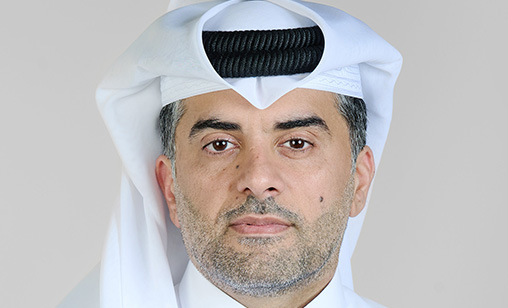 |
The decision gives VA the green light to operate 28 flights a week between Australia and Doha flying the routes under wet-leases with Qatar Airways. Utilising the Gulf carrier’s airplanes, VA will commence long-haul flights to Doha from Sydney, Brisbane and Perth in June followed by Melbourne to Doha in December. Twenty VA pilots and 40 cabin crew will be seconded to Qatar as part of the new partnership.
The flights will open more than 100 connecting destinations for VA across Europe, the Middle East and Africa. The ACCC’s authorisation of the acquisition also gives the Australian carrier, which started life as an LCC, access to the scale and expertise of a world leading global airline and facilitates its re-entry into long-haul international flying. It is a shift in the aviation landscape expected to drive increased competition in the Australian market and deliver greater choice and value for passengers.
For Qatar Airways Group, it marks another step forward in a series of major investments that are providing it with increased access to international markets across the globe. Its international airline investment portfolio is: 25.1% in International Airlines Group (IAG), 10% in South America’s LATAM Airlines Group, 9.99% in Hong Kong’s Cathay Pacific, 3.38% in China Southern Airlines and 25% in South Africa’s Airlink.
But the purse strings might be tightening. Qatar Airways Group CEO, Engr. Badr Mohammed Al-Meer, has confirmed the airline is nearing completion of an equity investment in Rwanda Air, a strategic addition to its network in Africa.
When asked about future acquisition plans, he said no additional purchases are in the pipeline beyond Rwanda Air.
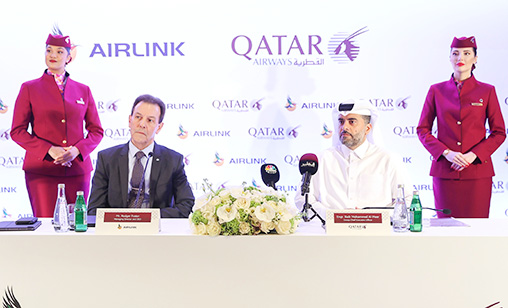 |
Al-Meer, who took over from his controversial predecessor, Akbar Al Baker, in November 2023, has continued to drive the group forward, not only on the investment front but in fleet and network growth while building a reputation for exceptional service. Last year, Skytrax named the carrier the World’s Best Airline for the eighth time. The airline’s home hub, Hamad International Airport - Al-Meer is the airport’s chief operating officer – was voted the World’s Best Airport and World’s Best Airport Shopping by Skytrax in 2024.
Post-pandemic, the airline is experiencing a revenue surge. After posting a record US$1.67 billion net profit in its previous fiscal year, Al-Meer said the airline is on track to surpass that result in its latest full year. His optimism stems from the airline’s strong financial performance, strategic investments and an expanding operational footprint particularly at Hamad International Airport.
The airport recently opened two new concourses - D and E - increasing annual passenger capacity to 65 million. Boarding gates have been increased 40% to 62 with 17 new gates now in operation.
While Al-Meer declined to disclose the specific financial details of the airport expansion, he said on the record the increased operating costs associated with a larger terminal complex will be offset by higher revenue and profitability. “The expansion will add value and increase annual net profits,” he affirmed.
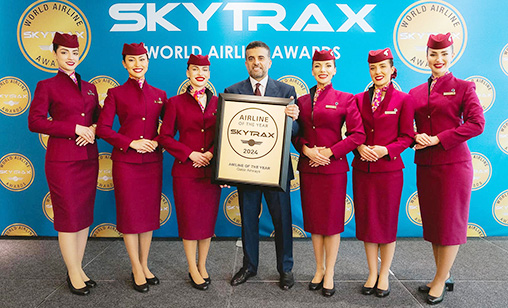 |
The potential for Qatar Airways to privatize or launch an initial public offering (IPO) remains under consideration. The Qatar Investment Authority and other governmental bodies are reviewing these outcomes. There is an increasing trend at Gulf airlines to consider IPOs - such as Etihad Airways and flynas - and a Qatar Airways potential entry into public markets aligns with broader regional industry movements.
While airline mergers have become a common trend among European carriers seeking financial stability, Qatar Airways has no plans to follow suit. Al-Meer has emphasized that unlike struggling European airlines, which often merge to avoid bankruptcy, Qatar Airways remains financially strong and independent.
As it continues to expand its network, now at 170 destinations, the airline’s fleet growth is a focus. In March, the group signalled it will place a large order for wide-bodies to “secure long-term growth”. At present, the fleet is 109 A320s, A330s, A350s and A380s plus 121 B737 MAXs, B787 Dreamliners and B777s. Orders are in place for 11 more B787s, 25 B737 MAXs, 50 A32oneo and 18 A350-1000s.
China is a key growth market for Qatar, with Al-Meer stressing flights to and from China consistently operate at load factors of 88% plus with aircraft fully booked and generating substantial revenue. This underscores the airline’s strategic focus on high demand international routes, it said.
In Doha earlier this year, Al-Meer said an increasingly connected world has introduced unique challenges but also unearthed opportunities for cross-cultural understanding much to the benefit of the aviation industry. “Qatar Airways has strong and strategic diplomatic ties across the world and is a key player on the global stage. Demand for our services has remained high in peak and low travel seasons,” he said.
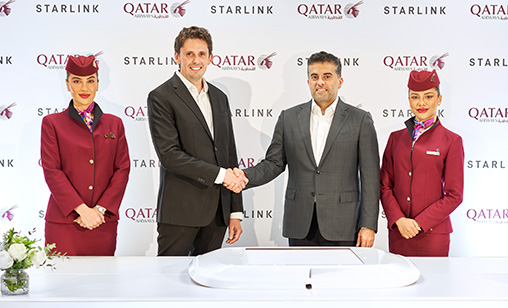 |
“With our partnerships in emerging markets in Africa, the Americas and India, we have built on our strengths of agility and commitment to sustainable growth to prove time and time again Qatar Airways remains resilient, nimble and responsive to change. “These qualities are essential for growth in a multi-lateral environment. Owing to its new vision, Qatar Airways 2.0, its dedication to the workforce, and its growing investments and partnerships, the group is an optimal case study for thriving businesses in rapidly evolving landscapes,” Al-Meer said.
World beating service standards have marked the carrier’s progress. It has been investing in digital technologies and innovative solutions to elevate its product offerings, particularly in its first class and business class cabins. This is demonstrated by its latest unveiling, the ‘QSuite Next Gen, at Farnborough Air show last year. It will debut on the airline’s B777-9s from 2026. It also is the first global airline to introduce Starlink Wi-Fi across its fleet.
Qatar is driving progress in environmental sustainability, a commitment integrated within its corporate culture. The airline is at the forefront of the aviation industry’s efforts to address climate change, particularly after the International Civil Aviation Organisation’s (ICAO) adopted global climate goals. Its strategy centres around four key pillars: advancing technology through fleet modernisation, optimising operations, utilising Sustainable Aviation Fuels and Lower Carbon Aviation Fuels and participating in the Carbon Offsetting and Reduction Scheme for International Aviation (CORSIA).
In March, VA and Qatar Airlines announced they will partner with Brisbane’s Renewable Developments Australia (RDA) to develop a 100% sustainable aviation fuel (SAF) project in Far North Queensland. Subject to final investment approval, RDA will construct an ethanol-to-jet (EtJ) plant and produce up to 96 million litres of SAF a year from 2029.
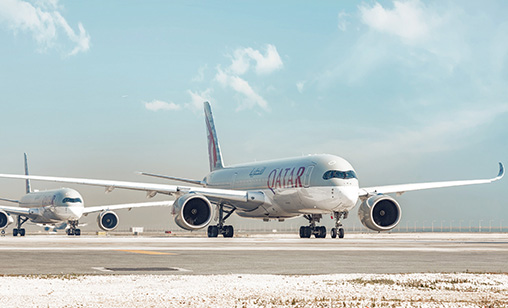 |
Qatar Airways Group has achieved several industry climate firsts in recent years, including the first airline in the Middle East to join ICAO’s Global Coalition for Sustainable Aviation; securing an offtake agreement for 25 million gallons of neat SAF; achieving accreditation to the highest level of the IATA Environmental Assessment (IEnvA) and joining the IATA Turbulence Aware platform. Globally, it is pioneering the use of the IATA Aviation Carbon Exchange. It is the first airline to join the IATA CO2NNECT platform that offers a voluntary carbon offsetting programme for air cargo shipments and the first airline in the world to achieve certification to the Illegal Wildlife Trade Assessment to curb the transport of illegal wildlife and their products.
Part of the group’s ongoing strategic approach is building more meaningful relationships with global audiences by solidifying the brand’s leadership position in the social media landscape. It is the world’s number one airline across social channels with more than 47 million combined followers and is the leading followed airline in the world on Facebook, TikTok and YouTube.
As for those airline investments, their significance cannot be underestimated. IAG is an Anglo-Spanish multinational airline holding company registered in Spain. It includes some of Europe’s biggest aviation brands - British Airways, Iberia, Aer Lingus, Vueling and LEVEL. Signed off in 2023, the partnership created the world’s largest airline joint business covering 60 countries.
LATAM is Latin America’s leading airline group with a presence in five domestic markets in South America; Brazil, Chile, Colombia, Ecuador and Peru and with international operations in Latin America and destinations further afield. The investment in Cathay Pacific links the group with Cathay’s scheduled passenger and cargo services to Asia, North America, Australasia, Europe and Africa. China Southern Airlines is the largest airline in the People’s Republic of China with extensive domestic and global networks.
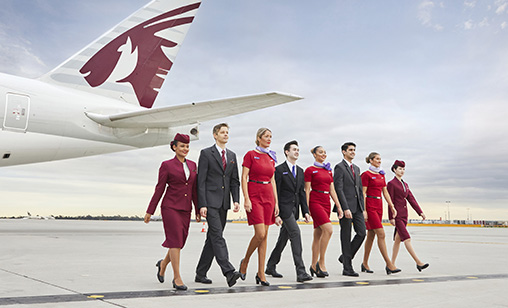 |
Its VA investment will be serious competition for Qantas Group in the battle for long-haul passengers heading to Europe, despite Qatar Airways being, like Qantas, a oneworld alliance member.
It sends a clear signal of the appetite for delivering competition, world-class service and value to Australian passengers, said Al-Meer. “It also marks a new chapter in the relationship between our two airlines. I would like to thank our Virgin Australia colleagues and valued stakeholders for their tireless dedication to our shared ambition to create healthy competition within the local aviation market, as well as our collective commitment to supporting Australian businesses, Australian jobs and the wider economy.”
Virgin Australia CEO, Dave Emerson, said: “This is a defining moment for Virgin Australia and the Australian aviation landscape. The ACCC’s final approval of our deeper strategic partnership with Qatar Airways marks a new chapter for our airline and a world of opportunities for our people and customers.
“Already, we are seeing some of the positive benefits of the partnership, including increased sales activity on airfares between Australia and Europe, the Middle East and Africa thanks to increased competition.”
For Al-Meer and Qatar Airways VA is another piece in the jigsaw for an airline very significantly increasing its footprint in global airline markets.
davidagena says:
December 8th 2025 07:58am